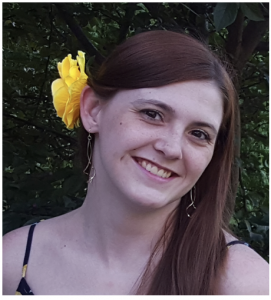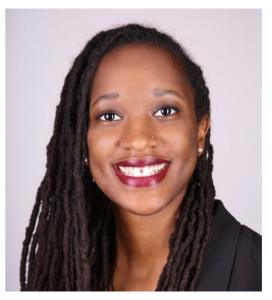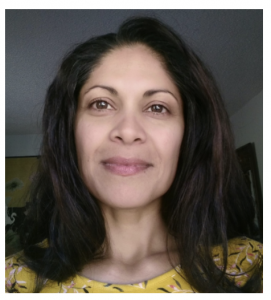We interviewed three statisticians who strive to change the world through data. We asked them who inspired them, why they became statisticians, and how data science is changing the world.
Hope Cullers
Research Data Analyst
Institutional Data Analytics + Assessment (IDA+A)
Participated in The Data Mine: Advancing data science for undergraduates through collaboration, learning, research, innovation, and entrepreneurship
What do you love about statistics/data science?
For me, the answer is twofold. Data science is more or less a mix of statistics and coding, each of which I love for different reasons. I love statistics because, while it can easily be manipulated and reported falsely, it’s the most direct path to honesty when used correctly. People can say whatever they want in news articles and research papers, but if you have access to the data and can run the numbers yourself, you have the power to share the truth. On the other hand, I love coding because it’s almost like a game. Getting the code to do what you want it to do is rarely straightforward, and you have to be creative and patient to figure out how to make it work. It’s like a logic puzzle, but with hundreds of possible solutions. As a result, data science is both a source of fun and power, and I really don’t think there’s a better combination than that.
What did you find to be the most exciting part of mentoring students in the Indiana Emergency Medical Services Association partnership in The Data Mine this year?
It was an incredible experience to know that the sole purpose of our work was to improve the lives of EMTs in Indiana. There were no business plots, no political incentives. We were simply trying to help people. And along the way, we all learned a lot. There was so much we didn’t know about EMTs before we began, and it was just such an interesting and complex topic for the students to research.
What did you find to be the most challenging part of mentoring students?
Due to the unique organization of our specific research group, I—along with another TA in The Data Mine—were more or less in charge of directing the group of students and leading the research. Saying I felt entirely unprepared would be an understatement. While I had participated in research before, I only had experience working one-on-one with a professor, so I had no idea how research should function among a group of people. I had to completely rewire my thought process and approach to research, while also figuring out how to lead a research project (which I had never done before) on a topic I previously knew nothing about. It was very much one of those situations in which you dive straight into the deep end, but I had so much support from Mark Ward and Ellen Gundlach. I wouldn’t have managed without their guidance.
Tell us one way data science is changing the world.
Just one way? How about a fun one? Data science can and has been used to predict how busy amusement parks like Disney World and Universal Studios are on any given day. By tracking the number of people inside a park and wait times at individual rides throughout the day every day for multiple years, it’s possible to predict with relative confidence what days are best to visit and even what route through the park will get you on the most rides with the least amount of wait time. Sure, that’s not exactly changing the world, but it sure does make your vacation a lot more fun.
How has data improved your life?
Is there any way it hasn’t? Data is everywhere, and it affects every decision. Heck, data helped create the data science initiative at Purdue, and not just because there are limitless amounts of data to be analyzed. Data on programs at other universities, data on career potential and growth, pricing data—it all played a part in starting the data science initiative at Purdue, which has led to the creation of the data science major and The Data Mine.
Name three people you find the most fascinating and tell us why.
I don’t think my answer to this one will be super related to the current topic, but I’ll answer anyway. The three people I find most fascinating are Cleopatra, Edgar Allan Poe, and Vincent Van Gogh.
Cleopatra is first on the list because she was absolutely brilliant and actually cared about her people. She spoke nine languages and was the first in her royal lineage to learn Egyptian (yup, you read that right, her ancestors did not speak Egyptian). She also was well educated and enjoyed the company of scholars; it was actually more likely that her voice and intellect were what made her beautiful, rather than her looks.
Edgar Allan Poe is second because so much mystery surrounds him. Quite a bit is known about his tragic life, but no one knows what was really going on inside his head or how he actually died in the end.
And last but not least on the list is Vincent Van Gogh because his story is far too tragic for the beauty of his paintings. He is by far my favorite artist. His paintings hold so much life, but he was teased relentlessly by those around him and only ever sold one painting—to his brother.
What are three pieces of advice you would offer your past self?
-
Don’t be afraid of taking opportunities. The worst thing that could happen is you’re told no, and a two-letter word is nothing to be afraid of.
It’s okay if you don’t know everything. Even when you have a BS and a full-time job, Google will still be your best friend. Honestly, if you think you know everything, that’s the real cause for concern.
Take a dance class. They’re fun. They’re easy. And it turns out it’s actually true that being active improves your overall academics. Who knew?
Crystal Grant
Congressional Science and Technology Policy Fellow
What do you love about statistics/data science?
When I look back at my PhD, the times I felt most inspired were when I was working with data. I took my first programming class in my first year. We had two months to do a project in R but I was so excited about it, I stayed up and did it all the night after we’d gotten the data! It was in that class I realized that, without data and rigorously applied statistical methods, we cannot generate new facts, we cannot advance knowledge or create truths. I realized then that science is wholly dependent on statistics. It began my love of statistics and data (and prompted my falling a little out of love with biology). I believe the insights we can glean from data can be used to improve many aspects of society and that socially conscious and ethical data scientists and technologies are needed to help correct existing biases in tech and make statistics a tool for social justice.
Tell us one way you want to use data science to change the world?
There are many ways I’d like to use data science to change the world, but the most pressing was expressed in a recent Bloomberg Opinion piece by Cathy O’Neil, the author of Weapons of Math Destruction. In her piece, she suggests repurposing algorithms used to determine someone’s risk of committing a crime (though predicting such a thing is impossible) to instead better understand the sociological factors and structures that coincide with increased risk of being charged with a crime. Rather than using this data to try to predict the future, it needs to be used to fix the present. Many algorithms, whether in banking, health, or criminal justice, are pointing to the same risk factors in predicting worse outcomes and making it clear racism, poverty, and discrimination are the root cause for differences between people. Until the social structures and racial injustices leading to the training data being biased are addressed, the data and all algorithms generated from it are useless.
How has data improved your life?
I easily become enveloped in, maybe obsessed with is more accurate, whatever coding project I am working on at the time. Learning new skills, techniques, and languages has become something I can’t imagine not doing in my future career. I am excited about data science because, when I’m working with data, I’m at my most mentally engaged and feel my most creative. It sounds nerdy but I didn’t understand the concept of flow until my second semester of intro computer science. I started a project at 8 p.m. and finished it at 8 a.m. the next day. I realized I’d been so engrossed, I’d forgotten to eat or sleep—that feeling is priceless.
Name three people you find the most fascinating and tell us why.
Seth Stephens-Davidowitz is a data scientist and author of Everybody Lies. I found his book so fascinating and think that Google trends is an incredibly powerful data set and reference to better understand and predict American behavior and opinions. I think all of his analyses were really inventive and eye-opening (a little disheartening).
Ruha Benjamin is a sociologist and author of Race After Technology. I find her focus on data being used to automate racial bias and, in health care, automate eugenics as fascinating as it is terrifying. Hearing her speak about the relationship between race and technology is captivating, and I’m so grateful she’s shining a light on the issue.
Fatimah Nyeema Warner, aka Noname, is an incredibly talented female rapper who created an international book club to educate herself and others about topics in sexuality, race, criminal justice, capitalism, and more. I ascribe to her level of authenticity, open-mindedness, and self-reflection.
What are three pieces of advice you would offer your past self?
Speak up more. Women are socialized to be likeable and not ruffle feathers. I let go of this in graduate school but wish I could’ve let it go much sooner—some feathers need to be ruffled.
Don’t be too intimidated to learn how to code. People who look like you are capable of coding; it’s not only for people who look like a cast member of “The Big Bang Theory.”
Read more books by black women: Morrison, Davis, Hooks, Giovanni. I discovered all of them so late, though better late than never.
Smita Skrivanek
Operations Director, Statistics Without Borders
Tell us about Statistics Without Borders.
An outreach arm of the American Statistical Association (ASA), Statistics Without Borders (SWB) is a volunteer-only group providing pro bono services in statistics and data science to nonprofits, NGOs, and governmental agencies. Its goal is to improve decision-making and promote public benefit through the proper application of statistical principles and best practices, especially where access to such resources is limited. Membership in SWB is free and available to all, regardless of where in the world you reside. You do not have to be a member of the ASA to be a member of SWB; all that is required is a keen interest in data-driven science and a passion for serving others.
What do you love about statistics/data science?
In the sense that data science (into which I include statistics, computer science, and other data disciplines) helps extract the meaning hidden in complex data, it is like knowing a foreign language—the data will reveal their secrets if you “speak the language” (i.e., if you frame your questions well and apply them skillfully through code and analysis). It is the most exhilarating feeling to approach a data set not knowing what you may find and ending with an insight that illuminates the crux of the problem. What’s not to love?!
What are the top three skills you need to be part of Statistics Without Borders?
Passion. You care about good science and want to make a positive impact on the world through the causes SWB serves.
Commitment. While you get to set your own volunteering limits, you can be depended on to see your commitments through.
Curiosity. You have a strong desire to learn about the issues SWB’s clients are involved with, and the motivation to drive deeper understanding of these issues.
While data skills are definitely a plus for an SWB member, we have plenty of positions available for non-data experts who are interested in becoming involved, such as client/volunteer management, marketing and communications, and operations, so don’t let a lack of programming expertise or being a student/retiree hold you back!
How has data improved your life?
Of course, we all know how data is applicable to almost all facets of today’s world. My life is no exception, with data figuring heavily in my daily choices, from self-tracking various personal health and financial measures to determining how much screen time is optimal (for me) to improving how I do my job. I’ve estimated my carbon footprint by collecting data on my home, transportation, diet, and activities and realize I have a way to go to get it down below 2 tons per year, but at least I now have visibility to the problem—and the solutions!
Name three people you find the most fascinating and tell us why.
Greta Thunberg: The teenage climate activist, for overcoming her utter distaste of public attention to capture the world’s imagination with her historic UN address on the urgency of the climate issue and for fearlessly speaking truth to power.
Wangari Maathai: For her unswerving commitment to social justice and environmental causes throughout her life in the face of gender and tribal discrimination and formidable political opposition. Her book, Replenishing the Earth: Spiritual Values for Healing Ourselves and the World, is an impassioned call to environmental volunteerism and her final piece of advice, a credo to live by: “Look at the problem in front of you and try to solve it. Don’t peer too far down the road and ask, ‘What can I do then?’ for you risk being overwhelmed. I firmly believe that most problems we encounter have a solution. Although a day may arrive when you come across a problem you cannot address, most of them you will be able to make a contribution to solving.”
Dr. Anthony Fauci: For persevering through all odds during the COVID-19 pandemic to champion science-based policymaking. His calm dissemination of the facts, measured pragmatism, and absolute refusal to engage in petty politics does the scientific community proud.






Leave a Reply